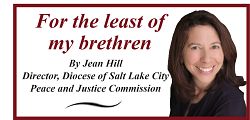Opening My Eyes to Racism
I am a white supremacist. No, I don’t spew, or believe, vitriol against people of color, but that isn’t the most accurate definition of white supremacy. I am a supremacist in the sense that I benefit from a society that developed over the centuries with an irrational but persistent bias in favor of people of lighter skin tones.
I learned about the benefits I receive from the happenstance of being born with a particular skin tone during the first of three multi-week programs my office is sponsoring for a small but committed group of individuals who want, to paraphrase Maya Angelou, to know better and do better.
As a group, we have learned much about ourselves, our nation and our brothers and sisters of color. For instance, while most of us understood that slavery had been justified through spurious scientific claims about the humanity of people of African descent, most of us were shocked to learn that Thomas Jefferson was the catalyst for much of this “science” in America. In his Notes on the State of Virginia, Jefferson wrote a rather lengthy list of his observations of what he felt was the superior beauty, intelligence and mannerisms of white people, leading him to “advance it therefore as a suspicion only, that the blacks, whether originally a distinct race, or made distinct by time and circumstances, are inferior to the whites in the endowments both of body and mind.” Jefferson’s suspicions led him to call for science to buttress his pre-determinations about the “inferiority” of African Americans. This call helped perpetuate the highly detrimental development of scientific racism, and the persistence to this day of myths about the superiority of whiteness.
Jefferson was not the first or only Founding Father to encourage the social construct of race. He and his fellow founders, including non-slave owners who also shared the view that white somehow equated to superior morals, intelligence, beauty and worth, established a nation built on these myths. Myths that enabled generations to come to readily and falsely label Black youth as super-predators, Black women as welfare queens, Black men as especially prone to violence, and Blacks in general as lesser human beings, and develop laws and systems around those perceptions of race.
Learning this history has been eye-opening. It convinced our group that all Americans need a far deeper understanding of American history in general and Black history in America in particular, as well as lessons in being a white ally to people of color. Through the experiences of Black men and women, including the powerful story of Austin Channing Brown in I’m Still Here, we learned how little we know about the lives of Black Americans. Through White Fragility by Robin DiAngelo we discovered that we are all racist, not in the usual sense of people who are mean to others based on race, but because our culture swims in the waters of racism swirling around us since before the birth of our nation. That doesn’t make us good or bad, it does make us complicit in upholding the systems and structures that benefit whites at the expense of people of color. Fortunately, we do not need to remain complicit, and our faith supports our efforts to recognize and reinforce the dignity and sanctity of every Black life, equal to every other life.
We also learned what white supremacy really looks like. It isn’t only the extremists who proudly declare themselves superior, it also is we who have never had any reason to fear the police officer approaching our car during a routine traffic stop. It is we who have the power to stop conversations about race when we feel uncomfortable, and so often do. It is we who were taught and believed the Civil War was about economics and states’ rights, when it was always about slavery and the commodification of Black men, women and children. It is we who have never watched someone approaching us on a sidewalk clutch their purse or briefcase more tightly. We have never been told to stop using an aggressive tone of voice because our anger is not acceptable, no matter how justified. It is we who have never been expected to serve as the spokesperson for all people of our race.
Our first sessions were difficult, emotional, inspiring, and a baby step toward racial justice. We enter into part two of the program knowing we will make mistakes, say and do things that are racist, and wish it was all so much easier to address. But we will also experience the grace of stepping out of our comfort zones, of learning more about the experiences of our Black brothers and sisters, and of acting for positive change in our communities and our church.
© Copyright 2025 The Diocese of Salt Lake City. All rights reserved.


Stay Connected With Us